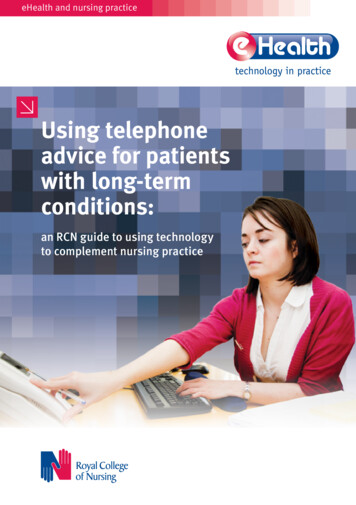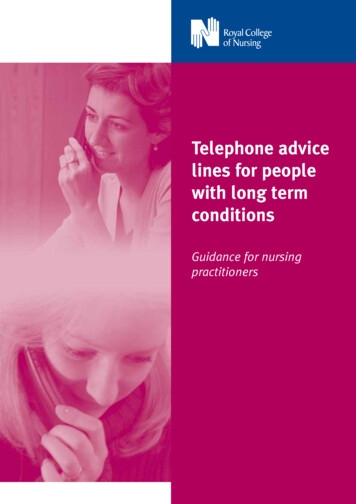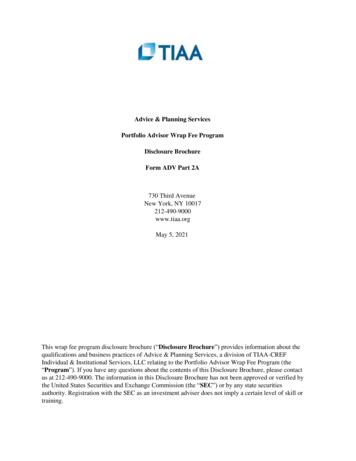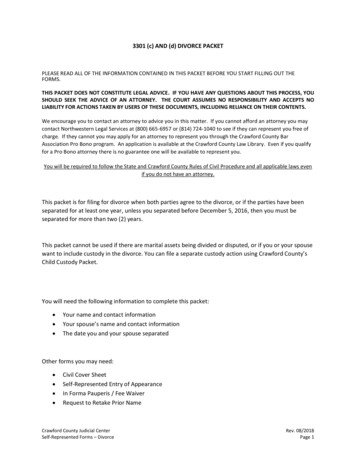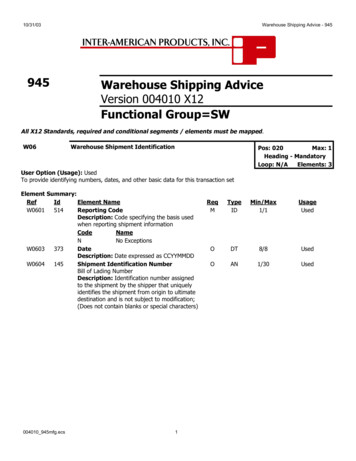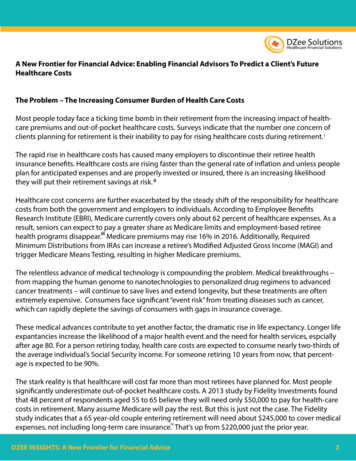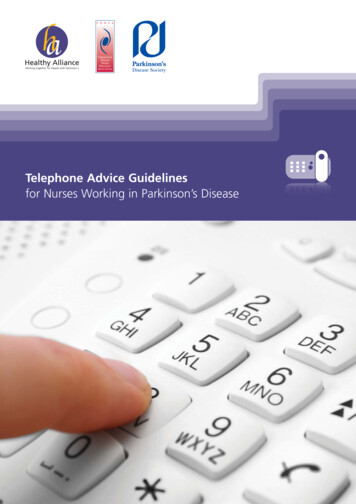
Transcription
Telephone Advice Guidelinesfor Nurses Working in Parkinson’s Disease
Telephone Advice GuidelinesIntroductionThis guidance has been developed by a team of Parkinson's Disease (PD) experts, in conjunction withHealthy Alliance to give practical advice for nurses and other healthcare professionals who provide,or are developing, telephone advice services for people with PD.The recommendations in this document should be supported by additional information, particularlythe Royal College of Nursing (RCN) existing ‘Telephone advice lines for people with long termconditions’ (May 2006)1, guidance related to the nurse/practitioner’s specialist areas of practice2,3 andany local agreements that may be in place.The content of the RCN existing ‘Telephone advice lines for people with long term conditions’ hasbeen used as a guide and point of reference for the content of these guidelines. Healthy Alliancewould like to thank the RCN for kindly providing permission to reference this document.ForewordThe Parkinson's Disease Society (PDS) welcomes the development of telephone guidelines which are specific to healthcareprofessionals working in PD.Approximately 10,000 people in the UK are diagnosed with PD each year, and every individual needs to be confident thatthey will receive the expert advice and support they need as their condition progresses. The complexity of the conditionmeans that there are a wide range of associated symptoms which are individual to each patient.PD specialist services are vital for patients with this chronic condition but are often stretched, with the patient case loadscontinuing to increase, which means that face-to-face consultations can often be many months apart. Access to servicessuch as telephone clinics can be an important form of interim support for patients in receiving reassuring advice anddirection from a qualified healthcare professional.The National Institute for Health and Clinical Excellence (NICE) guidelines in Parkinson’s disease (June 2006) advocate patientself-management and services such as this to assist patients in staying independent, whilst also giving them easy access toadvice on dealing with any issues which arise, for improved confidence/empowerment and quality of life.4The White Paper ‘Our health, our care, our say: a new direction for community services’ (January 2006) identified key areasfor change which included more personalised care driven by better access to information and services.5This guidance aims to assist nurses to implement these areas of policy in their clinics to improve standards of service forpeople with PD.Steve Ford, Chief Executive Officer, Parkinson's Disease Society1
1. Why Introduce a Telephone Advice Service?Telephone advice services provide a significant contribution to patient self-management, which is in keepingwith the philosophy set out in the Government White Paper, ‘Our health, our care, our say’5, and form animportant addition to care, providing ongoing support and education.The value of telephone support in the management of chronic diseases, such as PD, has been well recognised. However, thistelephone contact can be difficult to manage from a time perspective and formalising this activity can help nurses to managetheir time more effectively as well as setting important boundaries for patients in their care. By providing a dedicatedtelephone advice service, support can become more structured and streamlined. This service can also either enhance orfacilitate record keeping and the auditing process.Importantly, the Government is launching a new initiative under which healthcare professionals will prescribe information, aswell as medications, to patients. People with long-term conditions or social care needs will receive ‘information prescriptions’which will guide them to relevant information about their condition. A telephone advice service may offer support topatients who may have queries or concerns regarding any information they receive in a way that is controlledand professional for both nurse and patient.2. Setting-Up a ServiceWhen setting up a telephone service it is particularly important to manage the expectations of theusers and to plan and manage the service correctly.Considerations for setting up a service:Plan your infrastructure – spend time documenting your aims and objectives with your team to agree on a service whichsuits the setting, locality and structure of the team.Consider your caseload – identify the feasible amount of time in your week/day/month you are able to set aside fortelephone advice services.Check established protocols within your area – ensure that you are working within the local guidelines set by your employer.Cost considerations – ensure that you are working within local cost guidelines/funding available and seek guidance fromyour local PCT.For those Parkinson’s Disease Nurse Specialist’s (PDNS) working in the acute sector it is important to be aware of tariffs set thisyear, as all services provided will have a cost attached. Consider developing a robust business case to present to thecommissioners to secure funding for the service.Ensure that working on the telephone is in your job description – in order to ensure that your employers are awarethat you are setting-up and administering a telephone service.Mobile or office based telephone? – mobile phones can allow for greater accessibility but can also be more difficult tomanage. Consider using a landline telephone with a forwarding system to a mobile phone in case of emergencies (see TopTip box on using answer phone services). It may also be appropriate to consider setting up another line which is accessiblewhen your clinic is in progress.Patient confidentiality – identify a location that you will be able to conduct the calls in private to ensure the same level ofconfidentiality for patients you are consulting with over the phone, as those you would see in a clinic.Technology – review the current equipment in place for conducting the call, you might be able to request an update onyour phone and voicemail in light of the introduction of the service.2
Telephone Advice GuidelinesService Provision ScenariosThere are various scenarios where nurses might find themselves in consultation with a patient over thetelephone. You may find that just one or a combination of all of these scenarios should be used todevise a framework that is suitable for your service:Scenario 1: Telephone clinics with an appointment scheduleThis is similar to the face-to-face service but is conducted over the telephone and features pre-scheduled appointmentsmade in advance of the allocated timeProsCons Structured way to provide advice to patients in acost efficient manner Does not allow for dealing with ad-hoc patientissues/requests Encourages self-management and ownership fromthe patient Lack of flexibility provides no added value toservice for patients Can be easily cancelled/rescheduled in case ofholidays/emergencies Challenge in keeping to the allotted time frame toavoid patients calling and getting the engagedtone or answer machineScenario 2: Patient follow-up via telephone conducted by the nurseNurses set aside time each week to contact patients identified as requiring follow-up. The calls conducted are based onthe nurses’ discretion; a review of patient records or following recent face-to-face appointmentsProsCons Allows nurses to select patients who requirefollow-up Patients may not be available at time of thenurses’ call Ideal for patients who have just started onmedication who may only need 5-10 mins ofnurses time No time limit attached to call creates confusionand potential aggravation with patients Avoids inconvenience to patients of returning toclinic and saves on clinic space and time Does not allow for incoming calls from patientswith issues/requestsScenario 3: Clinic ‘Hotlines’Time-specific sessions for patients to call in regarding issues that have arisen since the last review or clinic appointment3ProsCons Effective use of time when running smoothly Frustrations can occur when patients can’t get through Encourages self-management and ownership fromthe patient More difficult to use time effectively Difficult for single worker services
Whichever combination of scenarios or type of service you provide it is essential to keep to this framework andcommunicate any changes that are made to all relevant parties in order to manage expectations effectively.It is not advisable to take calls ‘as and when’ as this provides no structure. Patients should be encouraged to go through theclinic hotline or, if possible, reschedule the call to a designated time.Important patient access considerations:Physical impairment – for patients with hearing problems this type of consultation may not be appropriate (or they will need tobe assisted by one of the ‘type talk’ services now available). Other PD-related problems such as speech difficulties will also impacton patient access and could impact their confidence when using such a service. This must be considered when offering this service.Language barriers – consider translating the information about the service or facilitating a conference call consultationwith an interpreter to improve access for patients who may have difficulties with English.The Language Line or the National Interpretation Service can also be used for advice lines, doctors/GP practices and 999services. By calling a freephone number a professional interpreter is available for a three way conference call and the serviceprovider will help to identify the language needed. There are costs associated with these services, although considerably lessthan hiring a full-time interpreter.For more information on telephone translation services, visit: www.languageline.co.uk or www.nisuk.co.uk(links tested September 07)It may be appropriate to have a patient’s carer/relative present on a consultation with a non-English speaking patient on athree-way call, which is also more cost-effective option and may also be preferable for the patient.Cognitive impairment – patients may have short term memory loss or difficulties in comprehending instructions.Ask the patient to repeat the advice which has been given or, if possible, ask to speak to the carer/relative to confirm theinformation/advice given.Defining your boundariesBy mapping out your service you should be in a good position to understand what you can and cannot provide as part ofthe service.It is important for nurses to remember that there may be more suitable avenues which the patient can take to address theirconcerns and that this should be communicated to the patients directly at the time.Communicating the details of the service to patients from the outset will assist you in setting clear boundaries, which youmust adhere to as much as possible.Training and competencyIt is important that you feel comfortable giving advice in a clinic-based setting before you initiate a telephone service. Nursesshould have ideally attended the Healthy Alliance Nurse Induction Programme before setting up a telephone advice service.Visit www.parkinsons.org.uk/for professionals.aspx (link tested September 07) to access ‘Competencies: an integratedcareer and competency framework for nurses working in PD management’ and the ‘National Service Framework for Longterm Neurological Conditions’ as well as a range of other professional resources to assist practitioners in PD.Core skills in conducting telephone consultations are not just about clinical experience or extracting information frompatients on sensitive issues but can also be about having the conviction to end calls.There are various courses available for training people to communicate on the telephone.Three basic courses include: Level 1: Foundation skills Level 2: Developing skills Level 3: Providing emotional supportHowever, there may also be local training sessions and support networks that you will be able to joint to assist you in honingyour skills.For more information, please visit: www.helplines.org.uk (link tested September 07)4
Telephone Advice Guidelines3. Maintaining a ServiceOnce you have established your service there are some core areas on which you should focus yourattention to ensure your service runs smoothly, maintains a high standard and continues to providebenefits to patients and the clinic.Recording information from callsIt is of vital importance that any information you are given by the patient during the call is managed with accuracy to ensurehigh standards of care.There are various practices that you can introduce to ensure that the telephone clinic information is used effectively: Add notes of correspondence to manual notes using a pre-designed sheet which includes all of the information thatneeds to be recorded Develop a template to record information from the telephone answering system which can be transferred to the notestemplate before you return the call If using an electronic database, ask the service provider or IT team about ways to easily log information sourced on the telephone Copy important information, such as changes in medication, to the wider team to ensure that they are up to date ondevelopments and can manage or advise accordingly When dealing with challenging patients or those with cognitive impairment, document the outcomes by sending a letterto them and their carer/relative to ensure that there is a written log of the conversation and the advice given When dealing with medication, worrying symptoms or other important aspects of a patient’s condition a letter should alwaysbe sent to the patient, carer/relative and GP. The patient should also be seen on a face-to-face basis as soon as possibleFor access to examples of recording templates, please contact healthyalliance@gsk.com or visit the Parkinson’s DiseaseNurse Specialist Association (PDNSA) website www.pdnsa.net or the PDS website www.parkinsons.org.uk.(links tested September 07)Managing time effectivelyIt might be useful to set consultation periods to a certain time period. The nurse should then use the Step by Step Guide inthis document to map out how long each step of the call might take and try to stick to this in order to manage call duration.Communicating a maximum call duration in the patient information distributed, as well as at the outset of the call, will alsoassist the nurse in keeping within the designated timeframe and manage the caller’s expectations.Returning callsAll standards which are set for conducting and returning calls must be realistic and achievable.It may be useful to develop a protocol document which sets out the process for returning calls. This might stipulate thenumber of times the nurse calls back before there is no further action or action which is taken if a third party answers the call.Handling inappropriate callsSome patients with PD may call their nurse for a social chat and it is important to explain that this is not part of the service.Most patients accept that nurses are busy and communicating this can be a good way of concluding the call. For all nurses,this situation is an example of the delicate balance between providing a good service for their patients and using timeappropriately to ensure optimum patient outcomes across the service.Patients with cognitive impairment may also be unnecessarily abusive and difficult to manage via the telephone. You mayalso experience distressed calls from patients who are suffering from depression or anxiety.For further advice and information please log onto the PDS website www.parkinsons.org.uk. (link tested September 07)5
Support systemsIt is important that you feel supported when conducting these calls on both a professional and emotional level.Dealing with issues which may arise should be referred to line managers. There should also be opportunities to debrieffollowing calls, to ensure that you feel supported and to prevent any feelings of isolation which may be experienced.Utilise regional PDNS groups or local nurse specialist meetings as a means of support if these are provided in your area.Administrative supportIf you have access to administrative support, it may be possible to engage with them to assist you in filtering and triagingcalls to other healthcare professionals, the content of which are outside of your remit. However, it is extremely importantthat non-medically qualified staff and those without experience in managing PD do not give out medical advice.4. Improving the ServiceIt is important that the service is constantly reviewed in order to improve standards of care.Getting feedback from patientsAs well as the initial audit of patients it is worth conducting an annual evaluation of the service with your patients to gaugeways in which you can make improvements to better fit their needs.Getting feedback from the wider teamFeedback should also be encouraged from the wider team, including GPs and multidisciplinary specialists. Requesting theirinvolvement in the development will also ensure they are more involved and more inclined to provide assistance in resourcingthe service.Share your knowledge and experiencesLearning from other nurses and healthcare professionals about their experiences with telephone advice services and sharingthis knowledge within regional groups can assist in aligning services across the local area.Audit reviewFollowing an audit it is useful to review and act on the results/data. This may alert you to discrepancies and will inevitablyimprove the overall service. It will also allow for continued benchmarking to monitor changes and improvements to the service.5. Governance IssuesPlease ensure you have read the RCN ‘Telephone advice lines for people with long term conditions’1 inadvance of setting up a service to ensure that all clinical governance issues have been considered.IMPORTANT TO NOTE: Safety of adviceIt is important to note that there should be clarity about the aims and objectives of the service, as well as the remit ofthe nurses/practitioners providing the support. In particular, nurses should be clear about their position regardingchanges of treatment or dosages and supporting documentation.6
A Step by Step Guide to Conductinga Telephone ConsultationWhat the telephone consultation should cover:1234Step One: Collect key information Caller’s name Date of birth Hospital/NHS number or address Telephone number Carer/relative information Permission to discuss information with carer/relative should a return call be requiredStep Two: Information required before offering advice Clarification of current treatment, monitoring or recent medical interventions/problems Confirmation of all prescribed medications including over the counter (OTC) and complementary therapies Any other medical or surgical treatments the caller is receiving from other specialists Check any allergies that patients may have to medicationStep Three: Establish a clear outline of the issue Clarify the problem and the steps taken by the patient to date to resolve the issueStep Four: Once the issue has been established Gain clarity and agreement on the steps necessary to resolve the problem or seek further help Establish time frame for self-management strategies if advised, when to review the success of suchstrategies and who should review them Agree what the caller should do if problems continue Establish a mutually agreeable time to return a call if a follow-up is planned Agree who will instigate the review call Communicate the patient outcomes to other healthcare professionals or third parties to ensureconsistency of care Document the outcome of any advice given and send to the patient and/or GP if appropriateNOTE: It may be useful to share any relevant information/documents with the patient in advance of the call to help them beprepared for the telephone consultation.7
TOP TIP: Conduct a Pre-Service Audit Before you set up a service it might be useful t
the Royal College of Nursing (RCN) existing ‘Telephone advice lines for people with long term conditions’ (May 2006)1, guidance related to the nurse/practitioner’s specialist areas of practice2,3 and any local agreements that may be in place. The content of the RCN existing ‘Telepho
